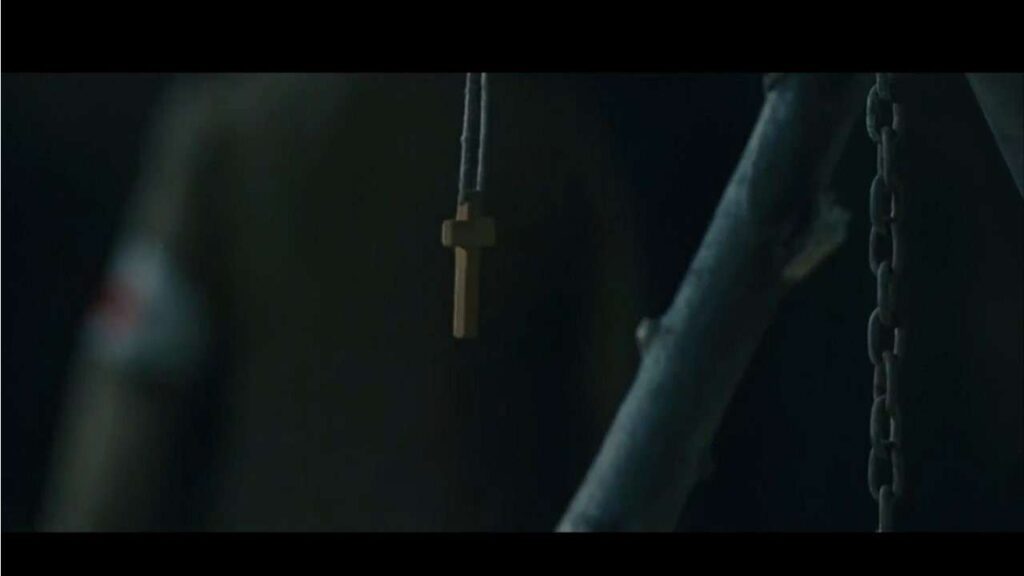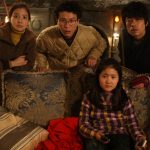The film is based on the Christmas truce of December 1914, a temporary ceasefire between French, German, and British soldiers during World War I. Though the war raged on, I believe these soldiers found a moment of meaning amid a conflict that felt senseless to their lives.
I was struck by the film’s opening, which reveals the origins and lingering dangers of war: indoctrination through targeted education that twists human perception into extremism. People uneducated in this way wage war out of personal ambition or anger—whether their own or someone else’s.
Joyeux Noel begins with three schoolboys standing before a blackboard, each representing their nation. One by one, they deliver sharp, condemning words against their rivals, concluding with an unforgiving resolve that justifies an inevitable fight to the death. These boys, reciting their lessons flawlessly, would later become young men wielding rifles, shooting at their fellow humans like killing machines in the name of ideals they didn’t fully grasp. Only amid the brutal battlefield did they realize that what they and their enemies truly craved was the same: a peaceful life.
Christmas Eve granted them a chance to live in that peace. German soldiers listened to the bagpipes of a British soldier, while French troops joined in the songs of a German. With no dictators on the front lines, they returned to their human essence, guided by instinct and heart to discern what was right.
That night, the front was free of gunfire, replaced by singing, blessings, and conversation. The Christmas Eve event felt like a miracle. But one miracle is enough to prove that wonders exist in this world. Human connection awakened these soldiers. Afterward, they worked together to bury the fallen and preserve the lives of survivors. German troops warned their counterparts to take shelter before devastating artillery strikes; British and French soldiers did the same.
Hymns and prayers stirred their consciences. Perhaps the three armies, under three different commanders, arrived at the same realization: bombs crafted from their people’s sweat and blood were used to tear apart those from other nations. Their flags might differ, but their blood ran the same color.
Too few soldiers grasped this truth compared to the war’s vast scale. Elsewhere, nations still clashed over ideals, gambling with lives. But the gamblers rarely fought themselves—so long as they lived, they kept betting, treating lives as an acceptable cost for ultimate victory. For those who died, their hatred fueled new wars, tragically passed down through schools and books like a malignant heirloom.
The silence amid war only amplifies its deafening roar. Today, war persists, still seen as a necessary solution despite its staggering toll and the generations it scars.
The Miracle’s End
The Christmas truce’s magic faded when humanity shed its human side, clashing once more like beasts. I admire the courage of the priest in the film’s final scenes: he rehung the cross. He saw how commanders misused faith to drag soldiers to war, urging them to pull triggers rather than pray. Promises of a distant heaven became one-way tickets to an earthly hell: the battlefield. Unable to stomach such deceit, the priest chose to abandon religion over his conscience. The cross hanging beside a chain offers a poignant metaphor worth pondering.
I think he was right—conscience is the only religion that keeps us清醒, not an opiate lulling us into a stupor, as a philosopher once said.
Though tied to Christmas, I believe Joyeux Noel suits any time of year. Its message might deepen our appreciation for the peace we have, help us understand its cost in the past, and perhaps even inspire humanity to realize that peace needn’t always come at a price in the future.
If humanity prides itself on civilization, how can it cling to such uncivilized solutions? Does a modern nuclear warhead—more destructive, more deadly—stand as prouder proof of the civilization we boast about?
I hope war remains only in films—grainy, black-and-white relics of a bygone era. That wish might feel unrealistic, but I believe where there’s hope, there’s a seed for miracles to bloom.















